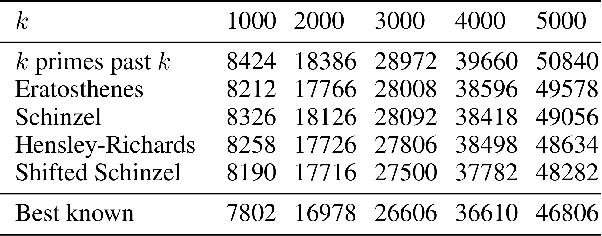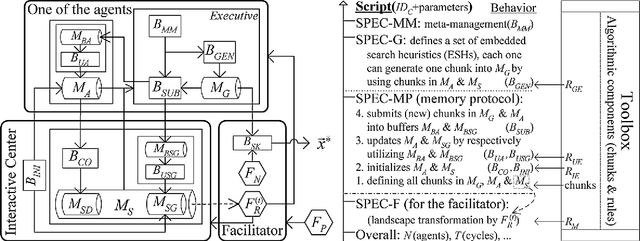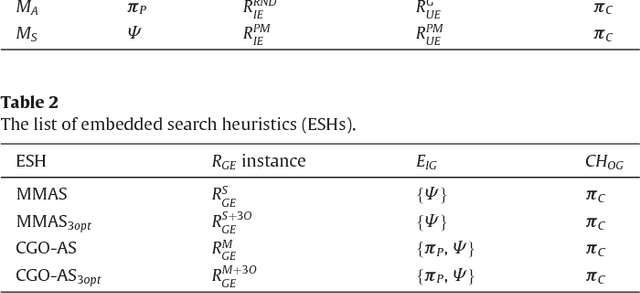Zun-Jing Wang
Exploiting Problem Structure in Combinatorial Landscapes: A Case Study on Pure Mathematics Application
Dec 22, 2018



Abstract:In this paper, we present a method using AI techniques to solve a case of pure mathematics applications for finding narrow admissible tuples. The original problem is formulated into a combinatorial optimization problem. In particular, we show how to exploit the local search structure to formulate the problem landscape for dramatic reductions in search space and for non-trivial elimination in search barriers, and then to realize intelligent search strategies for effectively escaping from local minima. Experimental results demonstrate that the proposed method is able to efficiently find best known solutions. This research sheds light on exploiting the local problem structure for an efficient search in combinatorial landscapes as an application of AI to a new problem domain.
* 7 pages, 2 figures, conference
A Cooperative Group Optimization System
Aug 03, 2018



Abstract:A cooperative group optimization (CGO) system is presented to implement CGO cases by integrating the advantages of the cooperative group and low-level algorithm portfolio design. Following the nature-inspired paradigm of a cooperative group, the agents not only explore in a parallel way with their individual memory, but also cooperate with their peers through the group memory. Each agent holds a portfolio of (heterogeneous) embedded search heuristics (ESHs), in which each ESH can drive the group into a stand-alone CGO case, and hybrid CGO cases in an algorithmic space can be defined by low-level cooperative search among a portfolio of ESHs through customized memory sharing. The optimization process might also be facilitated by a passive group leader through encoding knowledge in the search landscape. Based on a concrete framework, CGO cases are defined by a script assembling over instances of algorithmic components in a toolbox. A multilayer design of the script, with the support of the inherent updatable graph in the memory protocol, enables a simple way to address the challenge of accumulating heterogeneous ESHs and defining customized portfolios without any additional code. The CGO system is implemented for solving the constrained optimization problem with some generic components and only a few domain-specific components. Guided by the insights from algorithm portfolio design, customized CGO cases based on basic search operators can achieve competitive performance over existing algorithms as compared on a set of commonly-used benchmark instances. This work might provide a basic step toward a user-oriented development framework, since the algorithmic space might be easily evolved by accumulating competent ESHs.
Cooperative Group Optimization with Ants (CGO-AS): Leverage Optimization with Mixed Individual and Social Learning
Aug 01, 2018



Abstract:We present CGO-AS, a generalized Ant System (AS) implemented in the framework of Cooperative Group Optimization (CGO), to show the leveraged optimization with a mixed individual and social learning. Ant colony is a simple yet efficient natural system for understanding the effects of primary intelligence on optimization. However, existing AS algorithms are mostly focusing on their capability of using social heuristic cues while ignoring their individual learning. CGO can integrate the advantages of a cooperative group and a low-level algorithm portfolio design, and the agents of CGO can explore both individual and social search. In CGO-AS, each ant (agent) is added with an individual memory, and is implemented with a novel search strategy to use individual and social cues in a controlled proportion. The presented CGO-AS is therefore especially useful in exposing the power of the mixed individual and social learning for improving optimization. The optimization performance is tested with instances of the Traveling Salesman Problem (TSP). The results prove that a cooperative ant group using both individual and social learning obtains a better performance than the systems solely using either individual or social learning. The best performance is achieved under the condition when agents use individual memory as their primary information source, and simultaneously use social memory as their searching guidance. In comparison with existing AS systems, CGO-AS retains a faster learning speed toward those higher-quality solutions, especially in the later learning cycles. The leverage in optimization by CGO-AS is highly possible due to its inherent feature of adaptively maintaining the population diversity in the individual memory of agents, and of accelerating the learning process with accumulated knowledge in the social memory.
 Add to Chrome
Add to Chrome Add to Firefox
Add to Firefox Add to Edge
Add to Edge